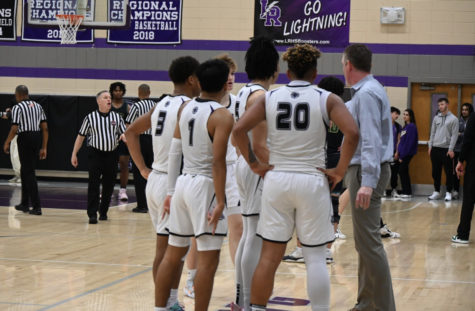Is There a Doctor in the House?
Recognizing Long Reach High School Staff with Doctorate Degrees
Pursuing a doctorate degree is a huge undertaking. Depending on the program, the time investment to earn a Ph.D. is about four to seven years after achieving a master’s degree. This means that doctoral students spend at least ten years invested in their studies from the start of their first college year.
While professionals can earn teaching accreditation through a bachelors, masters, or doctoral degree, each Long Reach staff member’s educational journey is unique. Today, we take a look at Long Reach staff who have made the investment in themselves to earn their doctoral degrees.
Dr. Sheppard
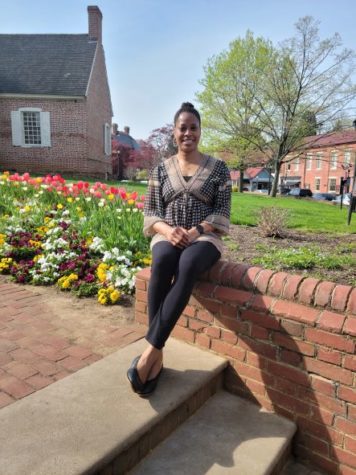
Rosalind Sheppard is Long Reach’s school psychologist, a trained mental health professional dedicated to working with students at Long Reach. Dr. Sheppard enthused about her advanced degree, “When I got my Ph.D., I was really proud of myself. I was the first person in the family to get a Ph.D.! I got a lot of love and support.” Having people supporting your goals while attaining a Ph.D. can definitely make a difference and can also make the process easier.
Did you always want to obtain your Ph.D.?
Dr. Sheppard admits that she didn’t want to get her Ph.D. after she graduated high school. “Even when I graduated College, I didn’t want my PhD. In psychology, having a Ph.D. is not needed.” Dr. Sheppard got her Ph.D. because “it offered many benefits like having my own business and becoming a licensed psychologist.” She acknowledged, “Everyone thinks it takes too much time… It was a lot of work, but it’s worth it.”
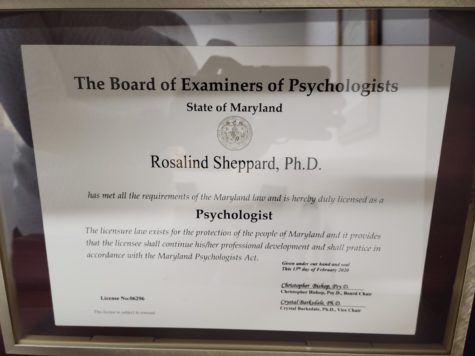
What was your attitude while working toward your degree?
Although getting a Ph.D. is a lot of work, that shouldn’t discourage you from getting more education and furthering your career. Being able to go after something you want even if it is a lot of work is inspiring. Many things are a lot of work but that doesn’t stop us from going after it. If you want something, go and get it, no matter what.
Even when Dr. Sheppard was working to get her Ph.D., she never wished she was doing something else. “I knew what I wanted to do and I am happy with my decision to go after a Ph.D.” Even though going after your PhD is hard and staying in school for 8+ years is even harder, if you are passionate about a field like Dr. Sheppard is about psychology, getting your PhD would benefit both your passions and your career.
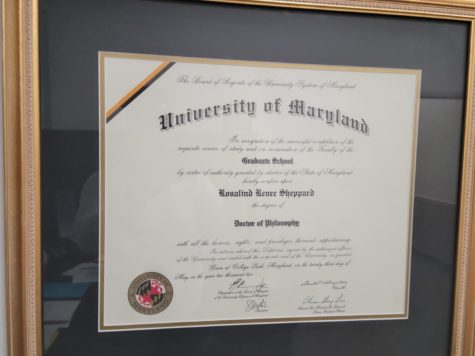
What advantages does having your Ph.D. provide?
In the end, Dr. Sheppard is happy she got her Ph.D. “I can work at a college level and I can open my own practice if I wanted.” Having a Ph.D. provides more career opportunities and various avenues that someone can follow during their life path. There doesn’t have to be one fixed road to a career, and a Ph.D. can provide those options.
Dr. Toronto
Allyson Toronto, a special education teacher at Long Reach, believes that “Having a Ph.D. as a teacher is important because it shows your dedication to being a lifelong learner.”
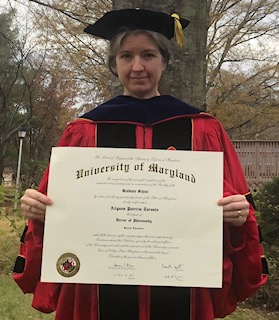
For Dr. Toronto, having a Ph.D. has allowed her to expand her thoughts and understanding, especially in the classroom. Dr. Toronto also believes having a Ph.D. impacts and affects her life as a teacher. “Research I did for my degree helped generate ideas to use in class.”
What struggles did you face in achieving your degree?
Dr. Toronto described the everyday reality of being busy while pursuing an advanced degree. As a result of the amount of workload and writing required, she said, “I sometimes would stay up until 2 am getting work done.”
Furthermore, the culmination of life circumstances have an impact on one’s journey in achieving their degree. Dr. Toronto explained, “In a way, I wanted to give up while going after my Ph.D. Time, an infant, and procrastination made the process hard. It took me 8 years to finish.”
What benefits have you found in having your degree?
Despite the troubles and hardships, Dr. Toronto is happy that she has her Ph.D. “Being called doctor isn’t that important to me. To me, I feel like I’ve accomplished something.”
To be able to accomplish something that you worked hard for is a great feeling, and earning a Ph.D. provides just that. Plus, teachers with their Ph.D.’s get to share their accomplishments with their students by teaching them new things.
Do you recommend pursuing a Ph.D.?
Despite the work and time, Dr. Toronto would encourage people to get their Ph.D. “It’s not for everybody, and going through the process takes years, but I still would encourage people to get their Ph.D.”
Dr. Harryman
Biology teacher Dr. Alexandra Harryman’s passions are teaching, learning and exploring, but the story of Dr. Harryman’s doctorate degree is one of persistence. She states, “I was never the student that got everything the first time. I had to read things several times; I was sometimes the deer caught in headlights, even in grad school.”
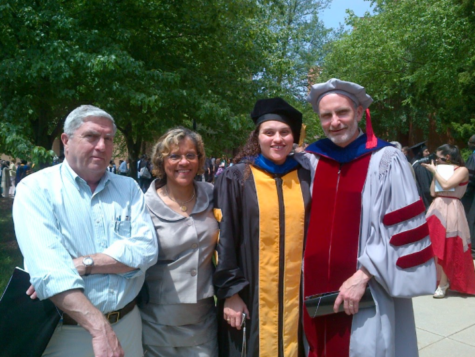
Dr. Harryman has always liked school, learning, and engaging. “I never felt like school was a burden or something that causes anxiety.” Dr. Harryman grew up around people who went to college and had higher education. “There was an unspoken expectation that everybody was going to go to college.”
Dr. Harryman was exposed to higher learning and education from the beginning. Dr. Harryman getting her PhD was in her path, whether she knew it or not.
What inspired you to pursue a Ph.D.?
Dr. Harryman was motivated to get a Ph.D. for personal goals. She said, “I wanted to push myself and I wanted to challenge myself to do something.”
She explained further, “I had a physics teacher in 7th grade that had her Ph.D. I thought her work was so hard, but we were fortunate to have really good teachers, not just because they had higher degrees but because they knew how to engage us…I think there is value to having a higher education in your field.”
What did pursuit of your degree teach you along the way?
Similar to most people, Dr. Harryman had her struggles. “My path to getting a PhD was not a linear one. It was not a straight path, not even one I expected.” Despite her struggles, Dr. Harryman was able to gain new skills from her obstacles on her path to a higher education. “I learned how to deal with adversity and setbacks and disappointments and even failures.”
Dr. Harryman also learned how to keep pushing no matter what. “I wasn’t perfect at everything I did, but I kept moving, and I still keep moving today. Anything worth doing is not going to be necessarily easy, and if it’s easy, it’s probably not worth it in the end.”
What did achieving your Ph.D. look like?
Despite the challenges and setbacks, when Dr. Harryman found out she passed and was going to get her Ph.D., she burst into tears. “I remember they send you out of the room, and they talk about you, and they bring you back in, and let you know their decision. So I came back in and looked in the room and saw them looking at me, and my boss was like, well you passed, and at that moment, I just burst out in tears. Everything that you did, every dream you had, all of that anticipation and hope and everything you had worked for just kind of melts at that one point, and it is the best feeling in the world.”
Do you recommend pursuing a Ph.D.?
Dr. Harryman would encourage people to get their Ph.D., but only if there is a purpose and value to it. “There has to be value in it and there has to be purpose to it. Make sure that purpose is meaningful… It brought a lot of value and richness to my life. It’s something to be proud of and it’s something to reminisce and remember.”
Regardless of their differing fields of study, all three staff members share a common message: If you are passionate about something, you should go after it. Work for it and make your dreams come true. You are in control of your destiny.

